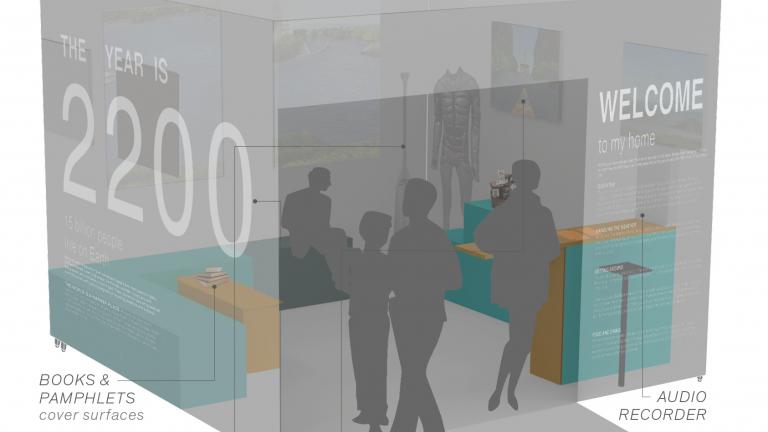
How can we help people understand and relate to climate issues through technology?
Johanna Hoffman, Climate CoLab "Shifting Attitudes and Behaviors 2018" contest winner and inventor of Climate Stories, has developed a mobile center to help people visualize and engage with climate issues. As Hoffman explains, “trying to plan for events that we’ve never seen before goes against our nature.” Climate Stories is designed to address those obstacles. Through a visually-immersive, interactive experience, Climate Stories makes the seemingly abstract impacts of climate change feel immediate and personal.

Set in a living room from the year 2200, the project offers a multi-sensory exploration of the world in 200 years. Users interact with objects within the living room, and see how rising sea levels, pollution, and global warming have changed day-to-day life. The room includes new technologies and supplies needed for this alternative future. Each object has interactive audio instructions to maximize learning opportunities and offer a deeper understanding of how climate change has the capacity to impact every aspect of our lives.
In describing her inspiration for Climate Stories, Hoffman states, “I’d been working in urban design and climate change adaptation for years and kept noticing big blocks in the ways people relate to climate issues…Climate change is incredibly hard to visualize. It’s such a huge process, with impacts that range from forest fires to winter storms to drought, that it’s often hard to connect to our own, individual experiences.”

In addition to offering users an emotionally and intellectually accessible experience, Climate Stories also encourages users to share their own experiences. Through the mobile platform, people can submit audio, written, or drawn responses sharing their feelings and stories, which are submitted to the Climate Stories database.
Users are also given climate action resources, and invited to donate to environmental campaigns, join local movements, and connect with the larger climate justice movement. “The whole point of looking towards the future is to inspire us to make better decisions today,” Hoffman says. “Because we’re not biologically set up to do that kind of long-term thinking, we need help.” Climate Stories offers that help, providing users with an immersive look at the future and inspiring them to act in the present.

While the scientific community is in near-universal agreement that climate change is real and dangerous, climate skepticism still is prevalent. Hoffman hopes that Climate Stories will help address this gap in understanding by offering a more personal window into climate impacts, while also gathering data on collective attitudes regarding climate change. Hoffman also aspires for the project to empower individuals and communities: “Even for those who accept that climate change is real…knowing which actions to take - what policies to enact, which time frames to address - remains a conundrum. Understanding climate change on a personal level is the key to overcoming these barriers.”
By utilizing a narrative, story-based approach, Climate Stories engages users with climate change in a very human, invigorating way. Hoffman and her team are excited by the Climate CoLab win, and the opportunity to improve upon, and expand the use of Climate Stories as a platform.





